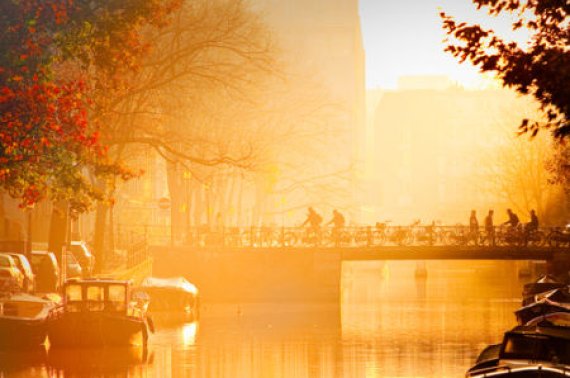Open water in a hot city works a bit like a fridge. But only during the day. In the early hours of the morning a pond functions more like a stove.
It is warmer in cities than in the surrounding countryside, by as much as five degrees on a hot summer’s day. Meteorologists do plenty of research on this heat island phenomenon and on what can be done to reduce the effect. Vegetation helps, for instance, by providing some cooling. Water helps too, or that is the general impression. But this impression is not entirely correct, show calculations by PhD student Natalie Theeuwes.
Radiant heating
Theeuwes designed a model of a big city on the scale of London or Paris. In the city she included one or more ponds, or none, and applied a weather model to it, based on a few summery days in May 2008. The results are striking. Needless to say, the model came up with the expected heat island effect: up to about five degrees. But the situation gets a whole lot more complex when there is open water involved. As expected, water causes cooling by day, but something else happens at night. In the early hours of the morning, between four and eight o’clock, the fridge turns into a stove. This is because at that time of day the water is warmer than the air above it. Theeuwes sums up the situation concisely: water cools, but not at night.
Evaporation
And the warmer the water, the bigger the warming effect it has. When water reaches 20 degrees Celsius – not unusual after a hot summer – the cooling effect by day is negligible compared to the warming effect at night. Along the banks of the water the temperature can be as much as 3.5 degrees higher than it would be without water. Downwind, depending of course on the wind and how built up the area is, the effects are noticeable for many kilometres. And the larger the expanse of water, the bigger the effect, although the correlation is not proportional.
The cooling effect by day is not as straightforward as was thought either, due to evaporation of the water. The temperature is experienced as higher when the air becomes more humid. We are all familiar with the feeling of a swelteringly hot tropical day. On such days, says Theeuwen, the cooling effect of the water can go down by up to 60 percent. On a tropical day you’d be better off jumping in the pond than hoping that the indirect effect of the water will cool you down.

